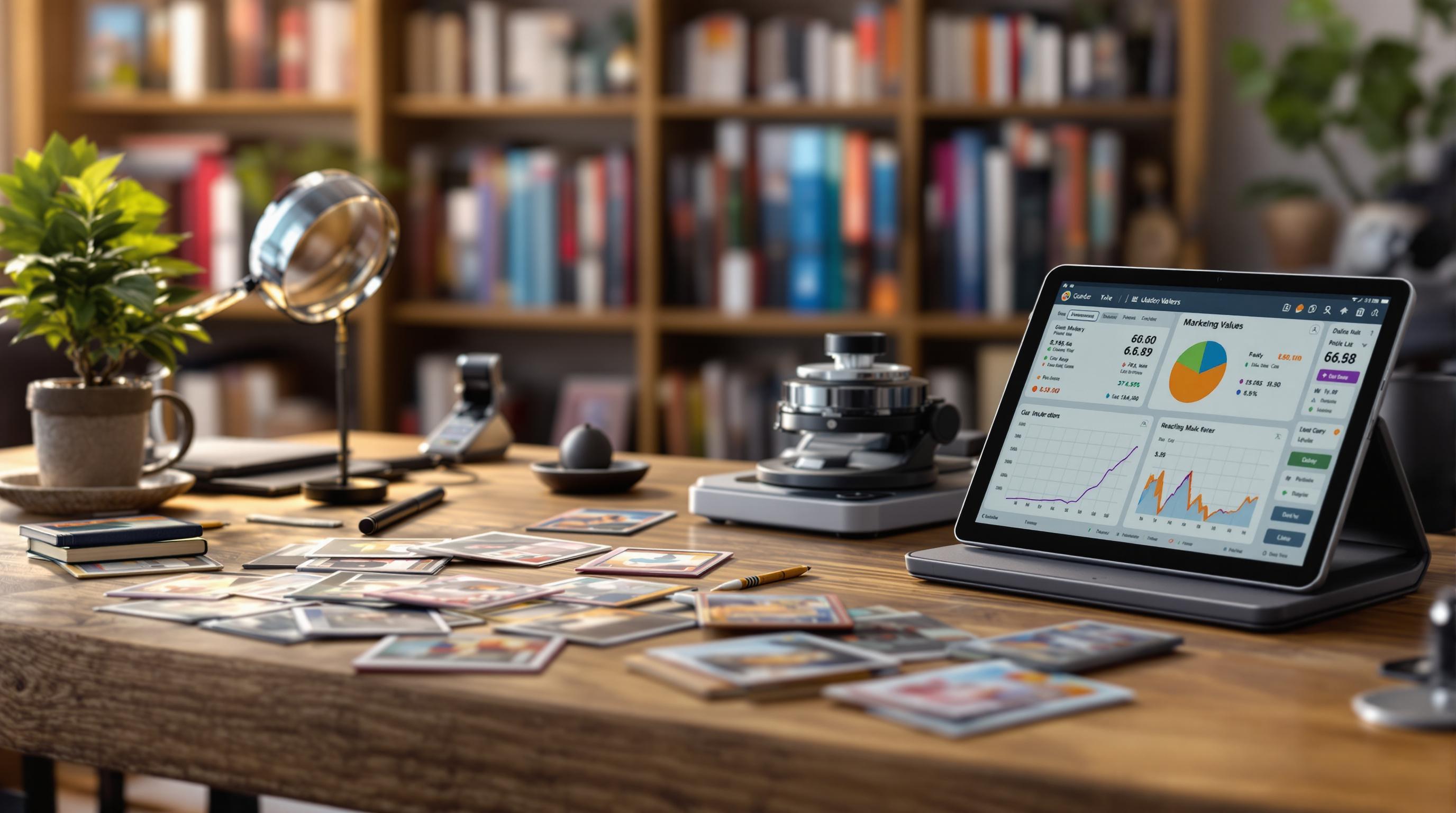Card value assessment tools help collectors determine the worth of trading cards by combining market data, grading standards, and live pricing. Here's what they do:
- Determine Value: Access real-time prices and historical sales data.
- Assess Condition: Evaluate card quality using grading systems (e.g., PSA, BGS).
- Track Market Trends: Monitor demand, rarity, and pricing shifts.
Key factors influencing card value include rarity, condition, and market trends like player performance or pop culture interest. Tools like eBay Sold Listings, TCGplayer, and PWCC Market provide real-time data, while grading services like PSA offer standardized evaluations. Local card shops also offer in-person appraisals and expert advice.
Quick Comparison of Popular Tools
| Tool/Service | Key Features | Best For |
|---|---|---|
| eBay Sold | Real-time sales data, 90-day history | Market trends and pricing |
| TCGplayer | Full price history, condition-based | Trading card games (TCG) |
| CollX | Card scanning, instant pricing | Quick appraisals and collection |
| PSA Grading | Standardized grading, population reports | Professional valuations |
Tip: Use a mix of tools and community insights to make informed buying, selling, and trading decisions.
Best Sports Card Apps | Scanning, Card Values, Tracking & More
Factors That Affect Card Value
Knowing what impacts a card's value is key to making the most of assessment tools. Several factors come into play when determining a card's market price and investment potential.
Rarity of Cards
Rarity is a major factor in card valuation. Cards with limited production runs or those that are harder to find tend to fetch higher prices. Examples include first editions, special variants like holographic or foil cards, alternate art designs, error cards, and promotional releases.
Assessment tools often spotlight rare cards, helping collectors identify those with higher market value.
Condition and Grading Systems
Card condition is another critical element, often evaluated using standardized grading systems from professional services. These systems focus on four main aspects:
| Grading Aspect | Evaluated Criteria |
|---|---|
| Centering | Border alignment and spacing |
| Corners | Sharpness and signs of wear |
| Edges | Damage along the edges |
| Surface | Scratches, print quality, and overall wear |
Grading reports from services like PSA are frequently included in valuation tools, ensuring consistent condition-based pricing.
Market Trends and Demand
Market trends significantly impact card values. A variety of factors can drive demand, including:
- Player Performance: For sports cards, an athlete's success can cause sharp price increases.
- Pop Culture Influence: Media buzz or renewed interest in a franchise can boost prices.
- Seasonal Patterns: Tournament seasons or release cycles often lead to value shifts.
- Set Completion: Cards needed to complete sets are usually in higher demand.
These factors often interact. For instance, even a rare card in excellent condition might see limited value if demand is low.
Modern tools often include real-time market data, enabling collectors to monitor price changes influenced by demand. Grasping these factors is essential to effectively using card valuation tools, which we’ll dive into next.
Best Tools for Assessing Card Value
Using Card Shops List
Card Shops List connects collectors with local stores, offering a chance for in-person evaluations and expert guidance. Visiting a local card shop comes with several perks:
- Face-to-face advice from knowledgeable dealers
- Hands-on card inspections to assess condition
- Access to grading services for submissions
- Local market insights, including pricing trends and demand
Online Platforms for Price Tracking
Digital platforms are a go-to for tracking card values. Here's a quick comparison of some popular ones:
| Platform | Key Features |
|---|---|
| eBay Sold Listings | Shows completed sales to highlight current market trends |
| TCGplayer | Offers price history and condition-specific pricing |
| PWCC Market | Provides auction results and detailed historical data |
These platforms rely on transaction data, giving collectors the tools to make smarter decisions.
Professional Grading Services
Grading services play a crucial role in card valuation by verifying authenticity and assigning condition ratings. PSA (Professional Sports Authenticator), Beckett Grading Services (BGS), and CGC are some of the top names in the industry. Each has its own grading scale and process.
- PSA is highly regarded in the sports card community and offers detailed population reports.
- BGS stands out for its subgrade system, which provides extra details about a card's condition.
- CGC is another trusted name, particularly for non-sports cards.
When picking a grading service, think about factors like cost, processing time, and how well the service is recognized in the market. Many digital tools also integrate data from these grading services, offering a comprehensive view of card values.
Card Shops List complements these digital and grading tools by connecting collectors with local experts. This combination of resources helps ensure accurate and efficient card evaluations - a topic we’ll dive deeper into next.
sbb-itb-0db97a5
Tips for Using Card Value Tools
How to Submit Cards for Grading
Before sending your cards for grading, inspect them under a bright light to check for any flaws like scratches, corner wear, or other imperfections. Use a microfiber cloth to clean the cards gently, and protect them with sleeves and semi-rigid card holders for safe shipping. Make sure to fill out submission forms accurately, including all card details, declared value, service level, and return shipping information.
Once your cards are graded, the next step is to stay on top of their market value.
Monitoring Market Prices
To keep track of card prices, rely on platforms that provide real-time data. Here's a quick comparison of some popular options:
| Platform | Real-time Updates | Historical Data |
|---|---|---|
| eBay Sold | Yes | 90 days |
| TCGplayer | Yes | Full history |
| CollX | Yes | Current market |
Using these tools ensures you're always informed about current trends and can make better decisions when buying, selling, or trading cards.
Organizing Your Collection Digitally
Digital tools make managing your collection easier and provide quick access to market data for accurate value tracking. For example, CollX offers features like automated card scanning and instant price updates [1].
Here are some tips to keep your collection organized:
- Create digital folders to sort cards by categories.
- Tag each card with details like condition, certification, and purchase information.
- Take photos of high-value cards for insurance purposes.
- Record your purchase history to track spending and investments.
For additional support, the Card Shops List connects collectors with local stores. These shops can assist with professional grading submissions, offer advice on managing collections, and provide insights into market trends. They can also help verify digital valuations through in-person inspections.
Other Resources for Collectors
Community platforms play a key role in helping collectors stay updated on market trends and connect with others for card valuation tips and advice.
Join Online Collector Communities
Subreddits like r/sportscards and r/TCG are popular spots for discussions about price trends and valuation strategies. These forums are great for getting real-time feedback on card values and conditions from seasoned collectors.
Discord servers have also become go-to spaces for collectors. They offer features like:
- Real-time price checks
- Market trend updates
- Access to experienced collectors for advice
Facebook groups, on the other hand, focus on local trading and organizing in-person meetups. These groups often include active marketplaces and share insights on regional pricing.
Additionally, specialized media outlets frequently publish interviews with grading professionals and market experts, offering tips for assessing card values. For hands-on learning, local card shops - many of which are listed on the Card Shops List - provide opportunities to interact directly with experienced dealers.
Final Thoughts
Card value tools have become indispensable for navigating today’s fast-changing market. These tools offer collectors real-time insights and resources to better understand their cards' worth. With the rise of digital platforms and grading services, card valuation has shifted toward more standardized assessments and readily accessible market data.
Professional grading services, such as PSA and Beckett, play a key role in ensuring accurate valuations. These services provide standardized grading that directly impacts a card's market value, making them a cornerstone of the hobby.
On the other hand, online platforms bring valuable market data to collectors. For example, eBay’s completed sales data is a go-to source for determining current market trends. This kind of real-time information helps collectors:
- Spot market trends with ease
- Determine fair trade values
- Make smarter investment choices
- Analyze population reports for rarity insights
Local card shops, like those listed in the Card Shops List, still hold their place in the hobby. They offer in-person evaluations, facilitate grading submissions, and provide expert advice. Meanwhile, apps like TCGPlayer, CollX, and Card Ladder bring advanced features to collectors, helping them manage collections and monitor market movements with ease.
"Technology has transformed card collecting, but understanding card value remains crucial. Using multiple tools ensures informed decisions."
Assessing card value isn’t just about the price tag. It’s about understanding the bigger picture - market trends, condition standards, and community insights that shape card values. By blending digital tools, professional services, and advice from the collecting community, hobbyists can navigate the market with confidence, reducing risks and uncovering opportunities in the ever-changing world of card collecting.
FAQs
How can I appraise my sports cards?
Appraising sports cards involves looking at several important factors. Tools like CollX use photo recognition to provide quick market prices. To get a more thorough evaluation, focus on these key aspects:
- Rarity of the card
- Physical condition (scratches, centering, corners, etc.)
- Market demand at the time
Pairing these tools with professional grading services and analyzing market trends gives you a well-rounded appraisal. For more details on evaluating a card's condition, check out the "Condition and Grading Systems" section above.
What is the best app to look up card values?
Apps like Ludex are excellent for identifying cards and finding their market value through image recognition. It works for both sports cards and trading card games (TCG). Another strong option is CollX, which offers features like:
- Quick market pricing
- Portfolio management
- Trading capabilities
When choosing a card value app, keep these factors in mind:
- How often pricing data is updated
- The accuracy of card recognition
- Extra features like collection tracking or trading
- Ease of use
- Size and variety of the app's database


